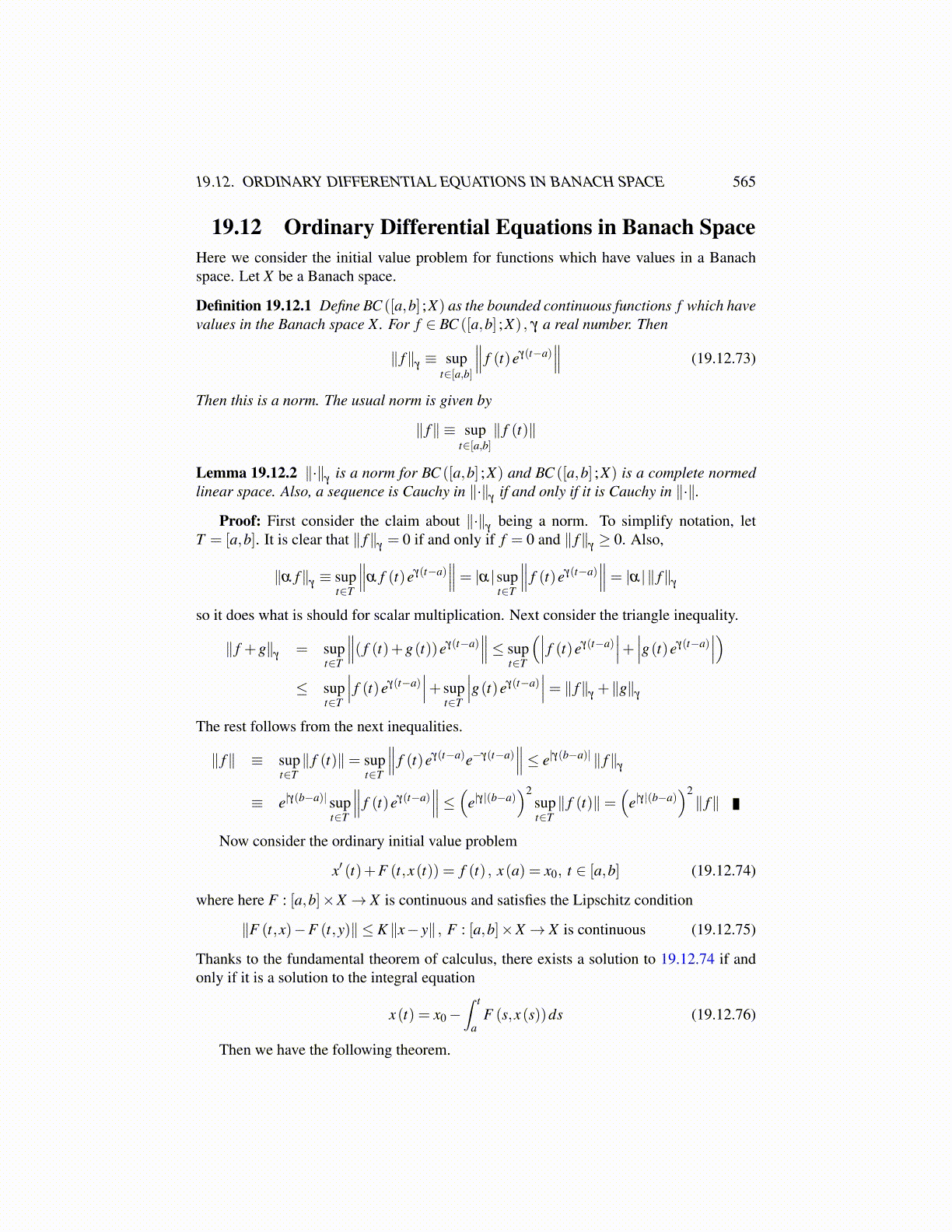
19.12. ORDINARY DIFFERENTIAL EQUATIONS IN BANACH SPACE 565
19.12 Ordinary Differential Equations in Banach SpaceHere we consider the initial value problem for functions which have values in a Banachspace. Let X be a Banach space.
Definition 19.12.1 Define BC ([a,b] ;X) as the bounded continuous functions f which havevalues in the Banach space X. For f ∈ BC ([a,b] ;X) , γ a real number. Then
∥ f∥γ≡ sup
t∈[a,b]
∥∥∥ f (t)eγ(t−a)∥∥∥ (19.12.73)
Then this is a norm. The usual norm is given by
∥ f∥ ≡ supt∈[a,b]
∥ f (t)∥
Lemma 19.12.2 ∥·∥γ
is a norm for BC ([a,b] ;X) and BC ([a,b] ;X) is a complete normedlinear space. Also, a sequence is Cauchy in ∥·∥
γif and only if it is Cauchy in ∥·∥.
Proof: First consider the claim about ∥·∥γ
being a norm. To simplify notation, letT = [a,b]. It is clear that ∥ f∥
γ= 0 if and only if f = 0 and ∥ f∥
γ≥ 0. Also,
∥α f∥γ≡ sup
t∈T
∥∥∥α f (t)eγ(t−a)∥∥∥= |α|sup
t∈T
∥∥∥ f (t)eγ(t−a)∥∥∥= |α|∥ f∥
γ
so it does what is should for scalar multiplication. Next consider the triangle inequality.
∥ f +g∥γ
= supt∈T
∥∥∥( f (t)+g(t))eγ(t−a)∥∥∥≤ sup
t∈T
(∣∣∣ f (t)eγ(t−a)∣∣∣+ ∣∣∣g(t)eγ(t−a)
∣∣∣)≤ sup
t∈T
∣∣∣ f (t)eγ(t−a)∣∣∣+ sup
t∈T
∣∣∣g(t)eγ(t−a)∣∣∣= ∥ f∥
γ+∥g∥
γ
The rest follows from the next inequalities.
∥ f∥ ≡ supt∈T∥ f (t)∥= sup
t∈T
∥∥∥ f (t)eγ(t−a)e−γ(t−a)∥∥∥≤ e|γ(b−a)| ∥ f∥
γ
≡ e|γ(b−a)| supt∈T
∥∥∥ f (t)eγ(t−a)∥∥∥≤ (e|γ|(b−a)
)2supt∈T∥ f (t)∥=
(e|γ|(b−a)
)2∥ f∥
Now consider the ordinary initial value problem
x′ (t)+F (t,x(t)) = f (t) , x(a) = x0, t ∈ [a,b] (19.12.74)
where here F : [a,b]×X → X is continuous and satisfies the Lipschitz condition
∥F (t,x)−F (t,y)∥ ≤ K ∥x− y∥ , F : [a,b]×X → X is continuous (19.12.75)
Thanks to the fundamental theorem of calculus, there exists a solution to 19.12.74 if andonly if it is a solution to the integral equation
x(t) = x0−∫ t
aF (s,x(s))ds (19.12.76)
Then we have the following theorem.